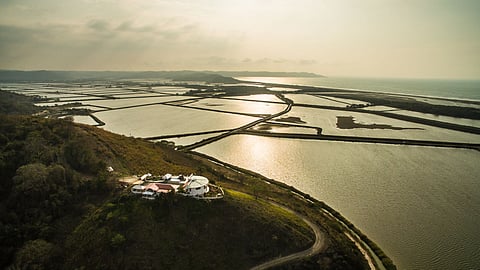

A road next to a shrimp farming area in Ecuador. Ecuador's National Chamber of Aquaculture has warned about the dangers of driving on these roads for all those involved in the shrimp industry value chain.
Photo: Adobe Stock.
A security guard protecting a shrimp feed truck is the latest victim of organized crime hitting Ecuador's shrimp industry. A colleague of his, who was injured in the same attack, remains hospitalized in intensive care, fighting for his life.
The murder, registered last Thursday in the province of Guayas, occurred just twelve days after a shrimp businessman was also murdered by a group of extortionists in the province of El Oro, according to police investigations.
Statistics from the Security Department of the National Chamber of Aquaculture (CNA, in its Spanish acronym) indicate that, just in the province of Guayas, there have been at least ten events reported between March and June of this year. These acts have left four people injured and one dead in this area of Ecuador, in addition to product losses of more than 200 thousand dollars.
"Circulate on first and second-order land roads has become a Russian roulette for all those involved in the value chain that transports products through routes that have been fully identified as dangerous," states the CNA's release. "The same happens on river routes both in the Gulf of Guayaquil and in the Jambelí archipelago," it adds.
Representatives of Ecuador's shrimp industry say recent murders and assaults are evidence of the growing threat of organized crime groups against the country's productive sector. In the aquaculture sector, in particular, this has generated a climate of insecurity and significant economic losses.
These problems are in addition to those that already exist in an industry that in 2023 saw fewer profits despite the increase in export volume, and also faces other problems such as energy shortages or the threat of the El Niño Phenomenon.
Thus, in an attempt to confront this growing wave of crime, the security management of the National Aquaculture Chamber has coordinated operational actions based on the exchange of information so that the Police and Armed Forces authorities can identify and neutralize the criminal action of criminal groups operating in shrimp farming areas.
However, the CNA recognizes that the lack of infrastructure, mobile units, equipment, and personnel makes it difficult to implement an effective 24/7 patrolling plan.
Because of this problem, the CNA has requested the Minister of Defense, Gian Carlo Loffredo, and the Minister of the Interior, Monica Palencia, to allocate economic resources in accordance with the needs of the control authorities.
"We raise our voice of protest against these criminal acts that do not find an efficient response from the authorities," said Jose Antonio Camposano, Executive President of Ecuador's National Chamber of Aquaculture, calling for an urgent political decision.
"The private sector and civil society are paying substantial economic contributions precisely with the excuse of addressing insecurity. Today these resources are not being used in highways and river areas where crime is once again taking over these areas with violence and impunity," he continued.
"Our call to the ministers of the industry is to take decisive action against these groups that attack us every day, to the shrimp sector and other productive sectors which are mobilized by roads in the country," Camposano concluded.
